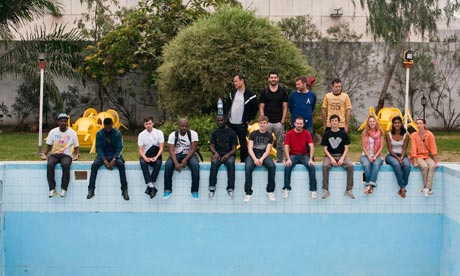
It's a credit to Damon Albarn's reinvention of himself as a musical polymath that he can announce a project as bold as this – bringing a stellar cast of dance and hip-hop producers to the Democratic Republic of Congo to collaborate with local musicians – and it almost feels like business as usual. "Is that all?" you're tempted to ask. He's not even going to convert the results into the Pelog scale and stage it as an opera? Underwater? Dude's slacking off.
Thankfully, such jaded attitudes are swept aside the minute you see the picture and video updates posted on drc-music.tumblr.com, which document Albarn and his crew's time in the DRC's capital, Kinshasa. The enthusiasm is infectious, yet the blog also highlights the challenge of making music in a region long plagued by war.
For one thing, the egalitarian notion that we now all have global access to music-making tools is made a mockery of when you see local musicians playing bottle tops and old tomato tins, or building drums from discarded fan belts (in contrast, the likes of XL boss Richard Russell and Gorillaz collaborator Dan the Automator arrive armed with iPads). To make matters more challenging, Albarn's time frame to complete this record was five days – about the time it takes most bands to plug their instruments in and remember where they put their guitar picks.
The project's brevity certainly explains the lack of coherence over the 14 tracks, although that's not to say there aren't some thrilling individual moments. "Three Piece Sweet Part 1 & 2", which comes charged with Bebson's raucous MCing over ping-pong synths, exudes the pleasures of an illegal sweatbox rave, the rough production providing a bootleg feel that only adds to the illicit high.
"Lourds", meanwhile, opts for a more traditional sound, thanks to Yende Bongongo's resonant vocals. But it doesn't always gel; in fact, the moody electronics befitting a Warp release gives tracks such as "Lingala" a strangely detached feel, muting the frenzied rhythms on display.
Only on opener "Hallo" does the melting pot sound like it's simmered for long enough to create a true fusion – a dubby duet between Albarn and Nelly Liyemge that could have sat on Massive Attack's Blue Lines. Incidentally, it is the only track on which Albarn sings. Maybe he was anxious not to be seen taking centre stage, yet it's hard not to view this record as another step on the expectation-confounding journey he's taken since Blur first fizzled out. Like 2002's Mali Music, a record met with considerable bafflement at the time and which now looks prescient, DRC Music's role in Albarn's musical evolution might make more sense in a few years' time.
The thrilling thing is that we have no idea where he'll be by then, although returning to the DRC to build on these foundations would be more than welcome. Providing he stages it as an underwater opera, naturally.

